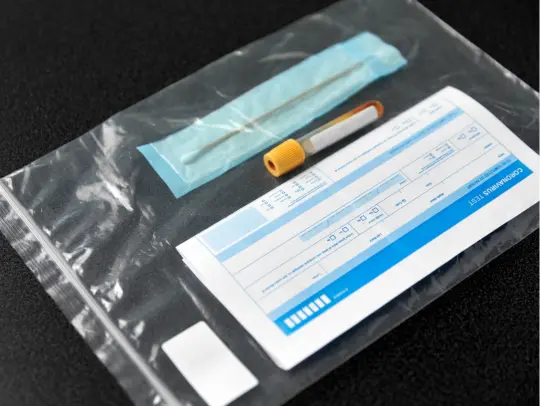
Nurse Practitioner Clarissa - Navigating Your First Sexual Experience: A Comprehensive Guide

Updated: 05/15/2025
Published: 05/15/2025
Navigating Your First Sexual Experience: A Comprehensive Guide
Experiencing sex for the first time is a significant milestone in many people's lives—a rite of passage filled with excitement, anticipation, and often a healthy dose of anxiety. Whether you're in a committed relationship or embarking on a more casual encounter, your first sexual experience can be both memorable and nerve-wracking.
This guide aims to provide thoughtful, practical advice to help you navigate this important step with confidence, respect, and a focus on both physical and emotional well-being. By understanding what to expect and how to prepare, you can create an experience that honors your boundaries while fostering intimacy and connection.
1. Consent: The Foundation of Healthy Sexual Encounters
Consent forms the cornerstone of any positive sexual experience. True consent is:
- Enthusiastic: All parties should genuinely want to participate
- Continuous: Consent isn't a one-time agreement but an ongoing process
- Freely given: Never coerced, pressured, or obtained through manipulation
Establishing clear communication about consent before becoming intimate helps ensure that both you and your partner feel comfortable, respected, and heard. Remember that consent can be withdrawn at any point during the encounter—if either person becomes uncomfortable or wants to stop, that decision should be immediately respected.
Creating an environment where both partners feel safe expressing their boundaries promotes trust and mutual respect. Consider discussing your expectations, boundaries, and comfort levels before becoming physically intimate. This conversation, while potentially awkward at first, can help alleviate anxiety and prevent misunderstandings.
2. Protection Matters: Prioritizing Sexual Health
Using protection is a vital aspect of responsible sexual activity, especially for first-time encounters. Protection serves two essential purposes: preventing unwanted pregnancies and reducing the risk of sexually transmitted infections (STIs).
Contraception Options
- Condoms: Provide protection against both pregnancy and STIs when used correctly
- Hormonal methods: Options like birth control pills, patches, or rings help prevent pregnancy but don't protect against STIs
- Barrier methods: Dental dams and female condoms can provide protection for various types of sexual activities
Having protection available before becoming intimate demonstrates responsibility and care for both yourself and your partner. Learn how to use condoms correctly, including proper storage, application, and disposal. Remember that oil-based lubricants can degrade latex condoms, potentially reducing their effectiveness.
Consider speaking with a healthcare provider about the most appropriate contraception methods for your situation. Regular STI testing is also an important aspect of sexual health, even for those in their first sexual relationship.
3. Communication and Relaxation: Keys to a Positive Experience
Nervousness is entirely natural when approaching your first sexual experience. Rather than trying to eliminate these feelings, acknowledge them and develop strategies to manage anxiety:
Relaxation Techniques
- Practice deep breathing exercises to calm your nervous system
- Create a comfortable environment with soft lighting, pleasant scents, or music
- Consider starting with less intense forms of physical intimacy to ease into the experience
Effective Communication
Open, honest communication before, during, and after sex helps create a positive experience for both partners. Some helpful communication practices include:
- Expressing what feels pleasurable and what doesn't
- Asking questions about your partner's preferences and comfort
- Using both verbal and non-verbal cues to guide the experience
- Being receptive to feedback without taking it personally
Remember that communication isn't just about words—paying attention to your partner's body language and responses helps create a more connected, mutually satisfying experience.
4. Being Prepared: Creating a Comfortable Environment
Preparation involves both practical and emotional readiness. On the practical side, ensure you have:
- A clean, private space free from interruptions
- Protection methods readily available
- Water-based lubricant, which can enhance comfort
- Clean towels or tissues nearby
- Water for hydration
Emotional preparation is equally important. Consider whether this is the right time, person, and circumstance for your first sexual experience. There's no "perfect" moment, but feeling comfortable, safe, and respected are important factors in creating a positive memory.
5. Taking Your Time: The Value of Patience
There's no need to rush through your first sexual experience. In fact, taking your time often leads to a more enjoyable, less stressful encounter. Consider:
- Engaging in extended foreplay to build arousal and comfort
- Focusing on exploration and discovering what feels pleasurable
- Recognizing that penetrative sex doesn't need to be the immediate goal
- Understanding that finding a comfortable rhythm takes time
Remember that sexuality is a journey of discovery rather than a destination. Your first time is just that—a first step in understanding your body, your preferences, and how to connect intimately with another person.
6. Embracing Imperfections: Keeping It Real
Media portrayals often create unrealistic expectations about sex, particularly first-time experiences. The reality is that bodies make noises, positions can be awkward, and not everything goes according to plan—and that's perfectly normal.
Instead of being embarrassed by these natural aspects of intimacy, try to:
- Maintain a sense of humor about awkward moments
- Remember that your partner is likely experiencing similar anxieties
- Focus on connection rather than performance
- View imperfections as part of the authentic experience
A lighthearted, accepting approach can transform potentially embarrassing moments into opportunities for laughter and deeper connection.
7. Emotional Safety: Beyond Physical Protection
Safe sex encompasses not just physical protection but emotional safety as well. First-time sex can trigger unexpected emotions, including:
- Heightened feelings of attachment
- Vulnerability
- Unexpected emotional responses (including tears, laughter, or mood shifts)
Preparing for these possibilities involves:
- Checking in with yourself about your emotional readiness
- Establishing trust with your partner before becoming intimate
- Understanding that sex can change relationship dynamics
- Being honest with yourself about your expectations
Remember that different people have different emotional responses to sex, and all these responses are valid. Some may feel deeply connected afterward, while others might need processing time—neither reaction is wrong.
8. Respecting Boundaries: The Power of "No"
You always have the right to say no or change your mind at any point during a sexual encounter. Respecting this right—both for yourself and your partner—is fundamental to a healthy sexual experience.
If something doesn't feel right or you become uncomfortable:
- Communicate your discomfort clearly
- Take a break if needed
- Remember that stopping doesn't mean failure
- Understand that boundaries can shift in the moment
A respectful partner will honor your boundaries without pressure or guilt. If someone doesn't respect your "no," remember that you have the absolute right to stop the encounter completely.
9. Post-Sex Care: The Importance of Aftercare
The moments after sex are an important part of the overall experience. Physical aftercare includes:
- Cleaning up comfortably
- Using the bathroom to reduce the risk of UTIs
- Hydrating and resting as needed
Emotional aftercare might involve:
- Cuddling or physical closeness if desired
- Talking about the experience together
- Giving each other reassurance
- Respecting the need for space if one partner requires it
This time can help process the experience and strengthen your connection. Some people need physical closeness after intimacy, while others might prefer some space—both reactions are normal and should be respected.

Peakbody Before and After Wipes
PeakBody Before and After Wipes
Whenever you need them, PeakBody® Before and After Wipes can help you keep your private areas clean.Regular Price $19.00
Your Price Buy Now!
Coupon automatically added to your cart
Conclusion: A Milestone, Not a Destination
Your first sexual experience is just one moment in your broader journey of sexual self-discovery. Approaching it with knowledge, preparation, and respect for both yourself and your partner helps create a foundation for healthy sexuality moving forward.
Remember that regardless of how your first time unfolds, it doesn't define your entire sexual future. Each new experience brings opportunities for growth, learning, and greater understanding of your desires and boundaries.
By prioritizing consent, protection, communication, and mutual respect, you can approach your first sexual experience with confidence and create a positive memory that honors this significant milestone.

Clarissa Guerrero
Clarissa Guerrero holds a certification as a Family Nurse Practitioner, which is recognized by the board. In 2020, she successfully obtained her board certification in family medicine from the American Nurses Credentialing Center.
Read more
.webp)


















































































